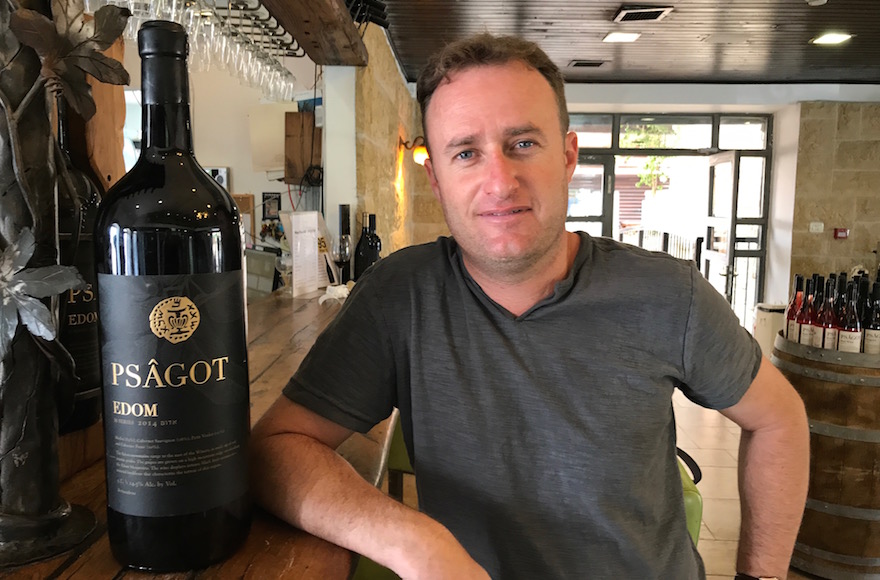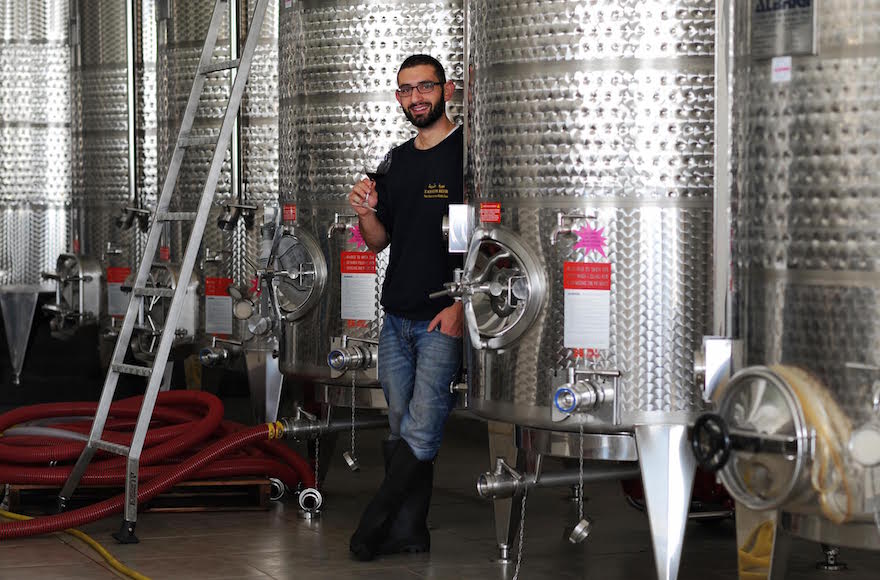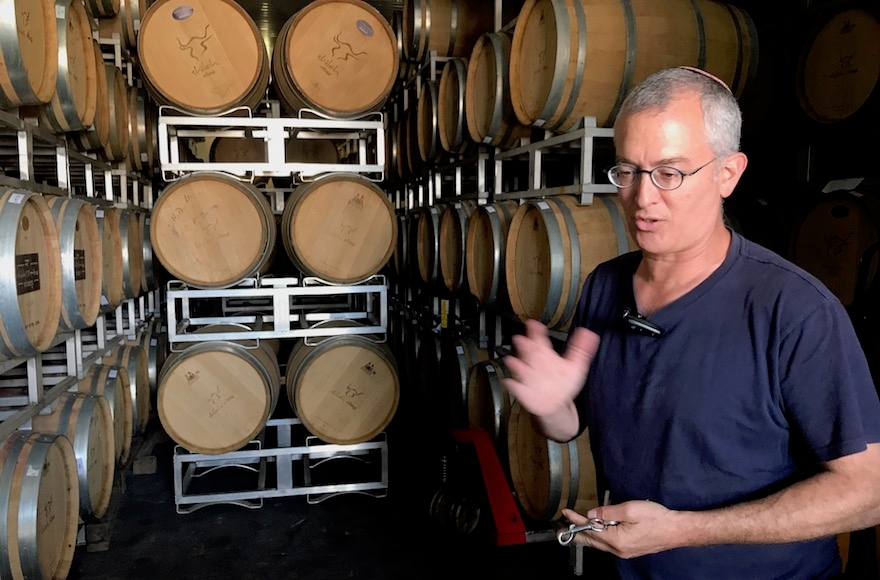JERUSALEM (JTA) — Canada apparently has barred wines imported from the West Bank from being labeled as products of Israel.
The Liquor Control Board of the province of Ontario on Tuesday asked vendors to remove such wines from their shelves and to stop importing them. The board cited a previously unreported July 6 ruling by the Canadian Food Inspection Agency that wine products made from grapes “grown, fermented, blended and finished in the West Bank occupied territory” could not be labeled “Product of Israel.”
In a letter detailing the new labeling policy, the board said the government food inspection agency had singled out the Psagot Winery and the Shiloh Winery, both in the northern West Bank.
The owners of those wineries expressed shock at the decision, which they said would be a major blow to their businesses. They said 60 to 70 percent of their wine was exported, and Canada was a major market. Still, they said under no circumstances would they remove Israel labeling from their bottles.
Amichai Lourie, the CEO of Shiloh Winery, located near the major Israeli settlement and university town Ariel, said doing so would be equivalent to carving “traitor” into his forehead.
“There is no bribe, there is no way it would happen that I would take off the wine we make in Shiloh Winery the words ‘Made in Israel,’” he told JTA on Thursday. “It’s the most ungrateful thing that a person could do to make a product in Israel and not stand behind it and be proud.”
Yaakov Berg, the CEO of Psagot Winery, situated on a hilltop overlooking the de facto Palestinian capital, Ramallah, said Canada’s decision would do symbolic as well as financial harm to West Bank settlement wineries like his.
“Canada is important not only because of the market, but also because of the image. Canada is North America. It’s not some country in the Far East,” he told JTA on Thursday. “Canada used to be our best ally. If it happens there, who knows what’s next?”
Settlement wineries have boomed in the West Bank in the past decade or so. According to a 2011 report, settlements in the territory are home to 29 of the more than 150 wineries in Israel and the other territories it captured in the 1967 Six-Day War, compared to 14 in the famed Golan Heights wine country. Several West Bank settlement winery owners reported exponential increases in production since the early 2000s.
Much of the world does not recognize Israel’s claims to the territories, and Israel has not annexed them. The international community considers Israeli settlements in the territories illegal and, in the case of the West Bank, an impediment to the creation of a Palestinian state. Israel disputes the claim and has its own complex and evolving laws regarding what makes a settlement legal.
Ontario’s Liquor Control Board, the province’s main retailer and distributor of alcohol, said the labeling policy applied not just to the West Bank, but also to “any other territory occupied by Israel in 1967,” and named the Golan Heights, eastern Jerusalem and the Gaza Strip. Because the “Government of Canada does not recognize Israel’s sovereignty over the territories,” it said in its letter to liquor vendors, “wine products from these regions that are labeled as ‘Product of Israel’ would not be acceptable and would be considered misleading.”

Yaakov Berg posing at his Psagot Winery in the West Bank, June 21, 2017. (Andrew Tobin)
“We are currently seeking clarifications from the CFIA on how such wines should be labeled in order to comply with the Food and Drugs Act,” the board added.
The Canadian Food Inspection Agency did not immediately respond to JTA’s interview request.
In a statement Wednesday, the Jewish advocacy group B’nai Brith Canada came out against what it called the agency’s “disturbing decision” and said it expected the agency “will soon rescind its recent decision to order the removal of certain Israeli wines from store shelves.”
The Toronto-based Friends of Simon Wiesenthal Center said it is contesting the policy.
“We consider any action which promotes the so-called Boycott, Divestment and Sanctions (BDS) campaign against Israel as antisemitic,” it said.
Meanwhile, Canaan Khoury, whose family owns the Taybeh Winery, a Palestinian enterprise located between Psagot and Shiloh, welcomed Canada’s decision, saying it was hard to argue with the logic.
“It’s not a very surprising decision for a government to try to not be hypocritical,” he told JTA on Thursday. “If a country recognizes that this location is not Israel, then why would it accept products being made here being labeled as if they were?”
Taybeh Winery is in talks with distributors in Canada about exporting to the country. Khoury said he did not know what the state’s labeling requirements would be. He said his family refuses to label their wines as made in Israel, which has created bureaucratic hurdles to exporting to some countries.

Canaan Khoury posing in a promotional photo at his Taybeh Winery in the West Bank. (Courtesy of Taybeh Winery)
Like the United States, Canada does not recognize a Palestinian state, arguing that it should be established through negotiations between Israel and the Palestinian Authority.
This is not the first time that West Bank settler wineries have been involved in a labeling controversy. In 2015, the European Union issued new guidelines that called on its 28 member states to label products made by Israelis in the West Bank as “made in settlements.” In addition to wine, such labels were to go on fruits and vegetables, olive oil, honey, eggs, poultry and cosmetics.
EU officials downplayed the move as a technical effort meant to ensure clarity about the products’ place of origin. But Israel reacted angrily, and many saw it as an effort to pressure Israel over its settlement movement. Only France has implemented the guidelines.
Lourie said the bigger obstacle to selling wines in European countries is the Boycott, Divestment and Sanctions movement. Although West Bank wines are recognized for their quality, having won accolades at international competitions, he said many distributors and vendors do not want the headache of dealing with potential protests. He expressed optimism that the situation would be different in Canada, where he said most people support Israel.
“The impression I get is that the problem in Europe is not going to get better, it’s going to get worse,” he said. “In Canada, I think the situation is different. We have many friends there. That’s why I didn’t see this coming.”
Berg agreed. But in the meantime, he said, Psagot is preparing to sue Canada for discrimination.
JTA has documented Jewish history in real-time for over a century. Keep our journalism strong by joining us in supporting independent, award-winning reporting.






